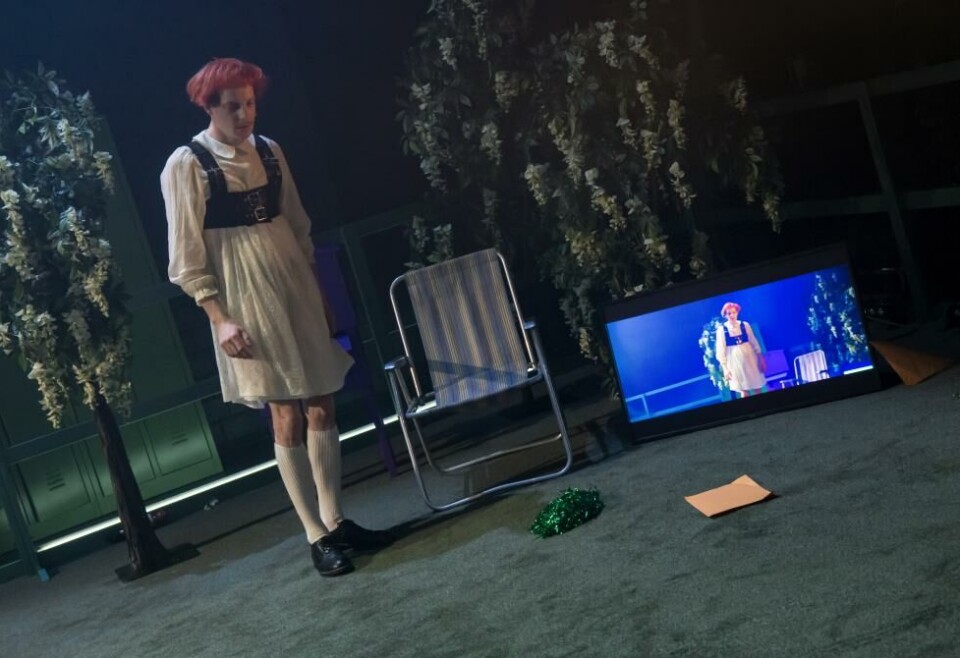
Pop Party Politicians
«The Politicians» by Wolfram Lotz (the author of «Die lacherliche Finsternis») is one of the most enigmatic pieces in recent German theatre. A new production of the theatre poem premiered for streaming in the repertoire at Thalia Theater in Hamburg, directed by Charlotte Sprenger.
In 2014, Wolfram Lotz’s play Die lächerliche Finsternis (The Ridiculous Darkness) established the German author as a playwright of remarkable qualities.
His position can be described as post post-dramatic in the way it combines the meta-theatrical strategies of ‘post-dramatic theatre’ with the serious issues of ‘realistic’ and ‘political’ theatre. This special position is reflected in his speech «The Impossible Theatre», about the reality of theatre in relation to the reality of a world that has become a media construct and therefore altogether unknown and incomplete. In this way, theatre as such is not the problem; the problem is rather its relation to other staged products of information.
Wizard of Loss
Theatre may take this into a moment of unblurring the conventions of common news knowledge for the subversion of such powers of perception. The Darkness play, originally written for radio, was a rewriting of Joseph Conrad’s Heart of Darkness and Francis Ford Coppola’s Apocalypse Now, as «Francis Ford Conrad’s Heart of Apocalypse»about German soldiers in Afghanistan. This is what Lotz makes so attractive: a Wizard of Loss for a media-savvy generation exhausted by too many theories of media critique, but who are still self-conscious about it.
The new play is something between a long poem and a strange monologue without a specific character. However, The Politicians defies easy categorization, and the author has suggested that this theatre poem can be understood as an epilogue to Darkness. Even more interesting is the origin of the text. For more than a year, Lotz wrote what he called a «Total Diary», a computer file of about 2,700 pages filled with thoughts and observations, as part of his daily routine. One day he decided to delete the voluminous diary from his files, keeping only the fragments that eventually became The Politicians. Thus, the theatre poem could be viewed as being only the tip of the iceberg, the rest of the text having melted away forever. The poem repeatedly addresses politicians, but also follows strategies of absurdity, with a DADA-like undermining of signification and humoresque doggerel. «The politicians think about the poor with contempt / Ai Weiwei, oh my!»,summing up the entire play in only two lines.
Acrobatic speech-acts
In a larger context of drama history, one might think of Peter Handke’s speech plays or even Dieter Roth’s famous Murmel Murmel, for which Lotz has expressed great admiration. The text offers an open and incomplete meaning for a challenge of meaning-making in theatre, or for the «Impossible Theatre»Lotz once analyzed in his speech.
The Politicians was first staged by Sebastian Hartmann as a monologue at Deutsches Theater in Berlin in 2019, with Cordelia Wege presenting the whole text in a breathtaking 30-minute solo as an epilogue to Hartmann’s free-floating associations around Lear. It was an acrobatic speech-act without any specific interpretation that opened a kind of competition how to stage this text and what it could mean or be.
Now the young director Charlotte Sprenger has taken a completely different approach at Hamburg’s Thalia Theater. Seven actors present the text around a huge rocking chair (holding an office for a politician) in a children’s room of German history from Uncle Kohl to Mum Merkel in the Corona crisis. Thus, real politicians become a reference for what is otherwise structured with lots of music from Italo-pop classic «Volare»to club culture or film scores from the Winnetou*-flicks of the 1960s. This makes for a lively, colourful show with costumes that seem to come from weird musicals.
A pop-song revue
But the question of Lotz’s text is not solved nor deeply explored. Rather it is celebrated through what it is surrounded by: pure pop that stands against the two real sound recordings from Angela Merkel announcing a special Easter lockdown (which she revoked the next day with apologies) and an aggressive speech by AfD politician Alice Weidel. The flashback to Kohl satirises an old tv-affair when the big chancellor complained about the uncomfortable chair offered him during an interview. Such additions from media history might represent a memory of ridiculous meaninglessness and thereby challenge this very understanding in times when more than a chair is at stake. It’s funny, but it’s certainly not enough. Sprenger’s pop-song revue may not be the ultimate solution for a staging of Lotz’s theatre poem, but it could at least make the text dance around its sinkholes of signification. By comparison, Hartmann and Wege’s juggling act did the text better justice.
Yet, the streaming of the Hamburg version is another good example of filmed theatre. The editing draws on the fragmented lines of the poem itself, while the viewer is also offered long shot images when necessary. These are important as they capture the whole of Aleksandra Pavlovic’s stage design with the rocking chair at the center, at one point moving as though caught in a mysterious earthquake. (Published 24.05.2021)
Footnote:
Winnetou = Hjortefot, in Norwegian. Editor’sremark.
